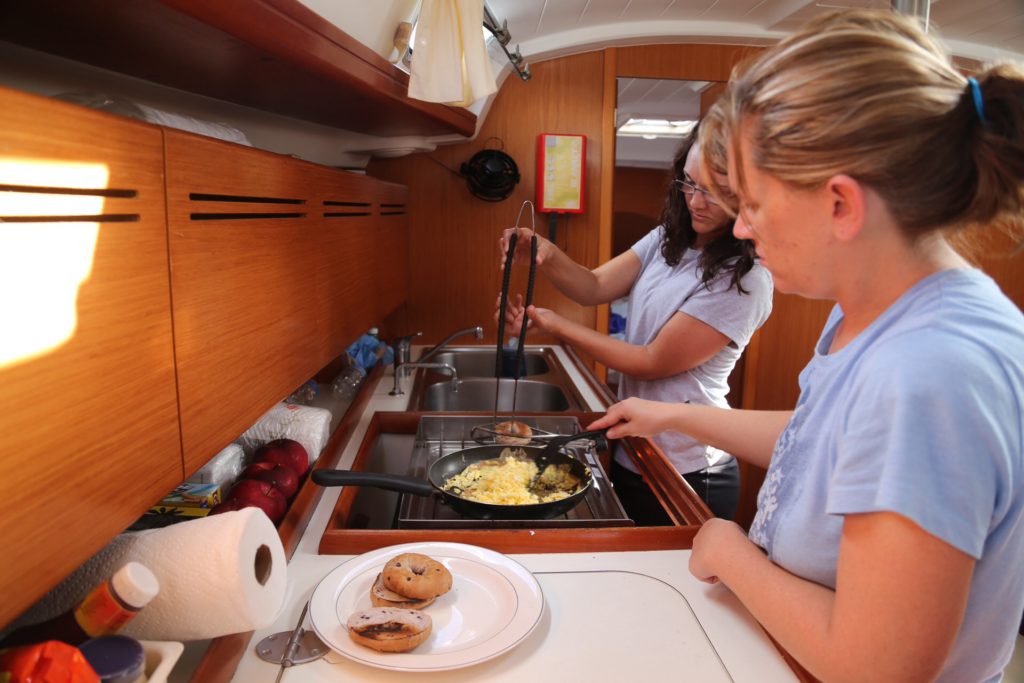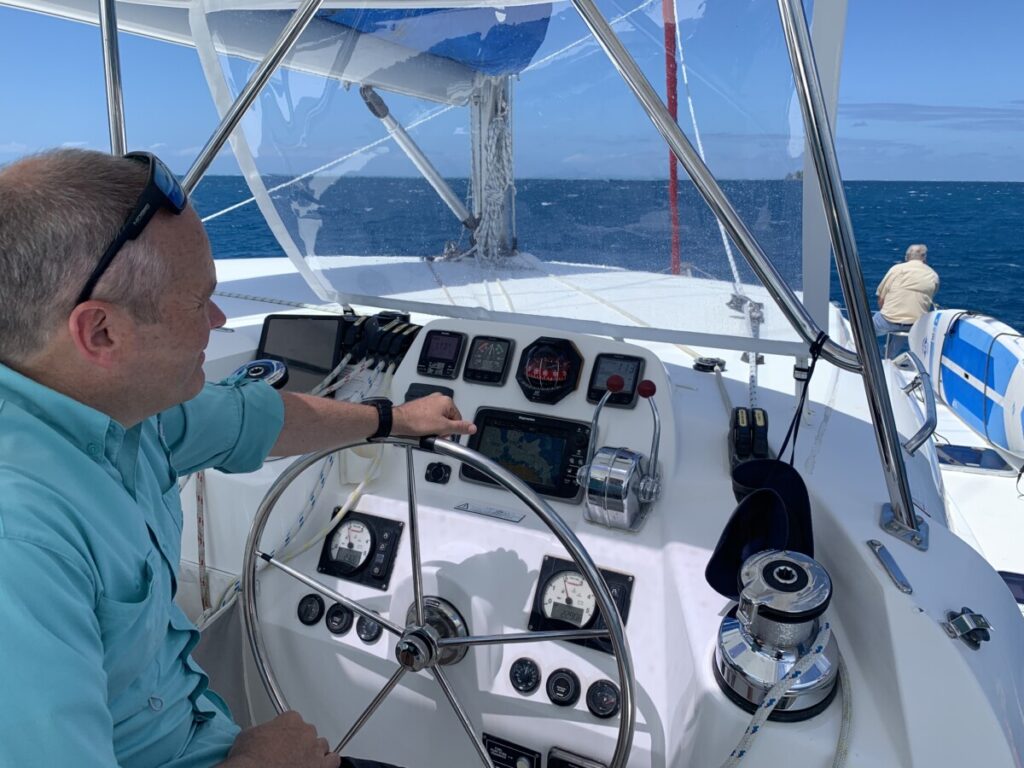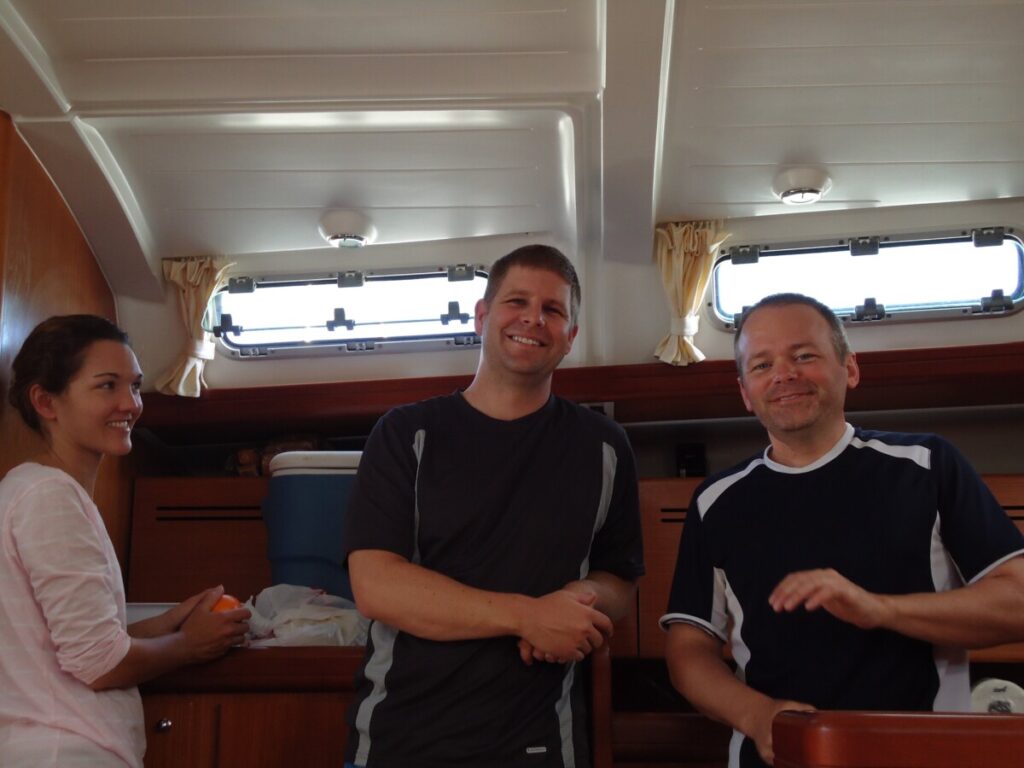Before I start, let me go on the record and say that a sailing vacation really is as idyllic as it looks. No vacation in the world matches the adventure and romance of sailing off on a sailboat, choosing your own course, your own deserted isles, spending your days on a bright blue sea and your nights being gently rocked to sleep under a canopy of a million bright stars. But it isn’t for everyone, and it’s not all sunbathing and snorkeling.
So whether you’ve been invited on a trip, or are thinking of one, I hope these 10 tips will help calibrate your expectations.

1) Be Flexible. The wind and waves have the final word when it comes to your planned itinerary. And though mother nature is amenable to your plans in most charter areas, she will make herself heard once in a while and you will need to alter your course and plans. Expect this, and you won’t be frustrated. In the words of the Muppets, “Hey, Ho, We’ll go anywhere the wind is blowing! Hoist the sails and sing! Sailing for adventure on the big blue wet thing!” This is the right attitude. An experienced skipper will always have a “Plan B” destination in mind in case things change, and at some point on your bareboat sailing charter, they will change! Prepare for this ahead of time, and don’t let it diminish your fun when it does.
2) Help Out. Unless you have hired a cook to join you on your bareboat charter, expect to help out with any cooking or cleanup. If you are sailing with friends, remember that the Skipper is on vacation too and will be busy with numerous technical chores on board. Pitch in, and help with the cooking, cleanup, and take a moment to ask if there’s anything you can do before you stretch out on deck and catch some sun. Most charter yachts are well-maintained so there isn’t a lot to do, but there are certain tasks that need doing each day.

3) Don’t Know How to Sail? No problem, your Captain will be doing most of that. Your Captain will likely have special training and certification to charter a sailboat, or substantial experience. If you want to learn, then ask lots of questions and take advantage of the opportunity to become a sailor. If you’d rather not, just expect to help out with simple tasks occasionally when needed.

4) Keep Your Things in Ship-Shape. The ocean never sits still. It’s constantly repositioning itself and everything on it. This includes your sailboat and everything in it. Before you set sail, take a moment to safely stow all your belongings. A sailboat underway is designed to heel, or tip, at varying degrees, and this means the camera or laptop you thought was sitting safely on the middle of the bed is now sliding off and headed for the floor. This could damage your belongings, or worse, be dangerous for anyone who gets in the way. Make sure items are stored in lockers (cabinets), drawers, or on lipped shelves designed to keep items in place. Monohull sailboats will heel more than catamarans, but regardless of what you sail, keep your belongings in their places.
5) Motion Sickness. Even if you never get queasy, it’s best to come over-prepared. Visit your doctor and get a prescription for scopalomine patches before you come. Pick up some bonine pills at your pharmacy while you are picking up your patches. Motion sickness isn’t a matter of toughness or weakness, it really does happen to everyone at one time or another. I realize what I’m about to say isn’t statistically valid conclusion, but my wife is one of the more motion-sickness-prone individuals I know, and she does just fine with a patch. If she can do it, you can too.
6) Friendships Afloat. Even the best of friends may have their relationship tested when they spend a week or two living on a sailboat. Night and day, in a space 50 feet long and 15 feet wide (or smaller) can put a strain on a friendship. So consider very carefully with whom you choose to sail on a bareboat holiday. We all have many wonderful, close friends and family at home who we love being around for a few hours or a day at a time, but carefully think through what might happen to those relationships with so much together time. I know many good friends who wisely choose not to charter together because they agree they aren’t the 24×7, small space kind of friends.

7) The Head. The “head”, in nautical parlance, refers to either the bathroom or to the toilet. Sailboat heads are a modern marvel, and as long as you respect a few basic rules, will not give you any trouble. Your Captain will give you specific how-to-flush instructions at the start of your charter, make sure you understand them. Heads have a simple set of valves that allow seawater in to flush, and pass their contents out to holding tanks or directly into the ocean. To keep these valves from clogging, follow flushing instructions, which will be explained by your Captain at the start of the charter. Report any questions or problems to the Captain immediately. And finally, as BVI charter companies succinctly state, “Nothing goes down the head that you didn’t eat.” Think about this for a minute, it’s an important limitation that must be carefully followed to prevent those simple little valves from backing up. I mention this ahead of time so there are no surprises for you.
8) Boat Noise, Air Flow, and Cabin Etiquette. Remember that a sailboat is constantly moving, even in a quiet anchorage at night. Expect to hear some noise at night, perhaps a halyard tapping against the mast, or the dinghy bumping into boat. Some people choose to bring earplugs, which is a good precaution (some boats are noisier than others.) Even if you have a boat with air conditioning, the Captain may choose not to run it all night. You cool your cabin by opening hatches on the roof, which are angled to scoop the wind down into your cabin. Your cabin will likely also have a small, low voltage fan which can be run at night to improve airflow. This means that all hatches are open up on deck during the night, and brings us to the last item: cabin etiquette. If you are up early and walk up on the deck of the sailboat, the open hatches will obviously invade occupants’ privacy. So if you are up early, etiquette involves walking quickly to where you are going, and not looking down into hatches. You will be very unpopular if you do not follow this rule.
9) Water Conservation. It seems counterintuitive, but water conservation is very important when sailing. Primarily because the stuff you are sailing on is not potable. A little common sense will help you go further between refills. Don’t leave water running while brushing teeth or washing dishes. If you are in a warm climate, quick swim overboard, followed by a rinse in a freshwater shower will save fresh water. Your head is likely equipped with a showerhead, but the one you use most will be a hose on the steps at the back of the boat, while wearing your swimsuit.
10) The Captain is the Captain. Although most of you sailing will be relaxing, you may find yourself in an urgent situation. In this case the Captain is in charge, so pay close attention to anything they ask you to do. Sailing an unfamiliar boat in unfamiliar waters will naturally lead to a few unfamiliar situations, and the Captain will need everyone’s help when those moments occasionally arise to keep you and the boat safe.

